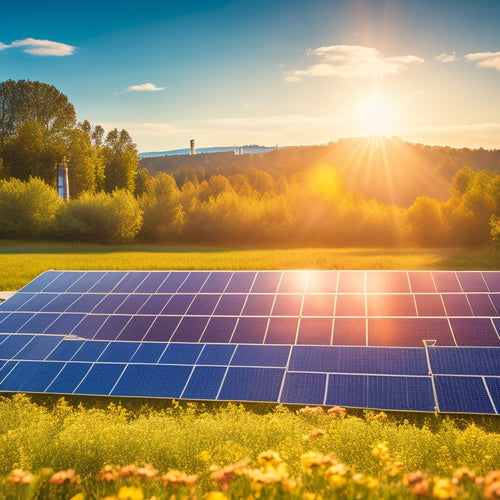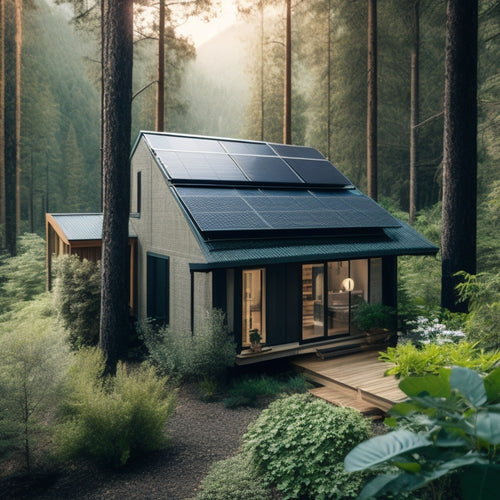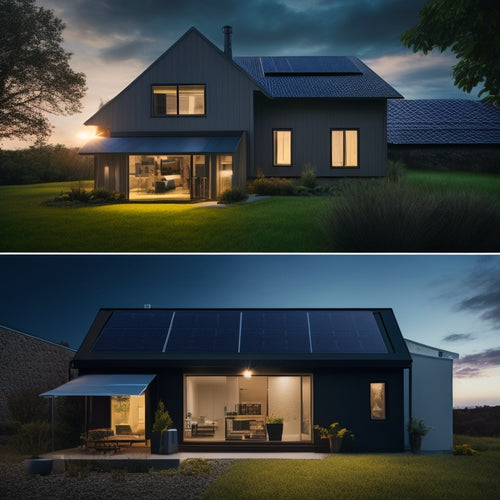
5 Tips for Off-Grid Energy Independence
Share
You're taking an important step towards energy self-sufficiency by considering off-grid energy independence, and it all starts with a well-planned system that meets your unique energy needs. To achieve this, you'll want to assess your energy needs by tracking daily energy usage and accounting for device efficiency and system losses. Next, choose the right system type, select high-efficiency solar panels, and consider battery storage options that fit your budget and energy profile. Don't forget to plan for energy backup during outages. By following these essential tips, you'll be well on your way to designing a reliable off-grid energy system that supports your independence - and there's more to investigate to guarantee your system runs smoothly and efficiently.
Key Takeaways
- Assess energy needs by tracking daily usage and accounting for device efficiency and potential system losses to ensure a reliable system design.
- Choose the right system type (grid-tie, off-grid, or hybrid) based on energy needs and budget, considering installation costs and component selection.
- Select high-efficiency solar panels (>20% efficiency) with durable designs and adjustable mounting options for maximum energy production.
- Consider a battery storage system with sufficient capacity, depth of discharge, and round-trip efficiency to guarantee a stable energy supply.
- Establish a reliable energy backup plan, such as diesel generators or propane-powered systems, to ensure energy independence during outages.
Assess Your Energy Needs
Frequently, homeowners overlook the essential step of evaluating their energy needs before diving into off-grid energy independence.
You need to understand your energy consumption patterns to determine how much energy you'll require from your off-grid system. Start by tracking your daily energy usage, including the number of lights, appliances, and devices you use. This will give you a clear overview of your energy consumption.
To get an accurate calculation, consider device efficiency and potential system losses in your energy profile.
Consider making lifestyle adjustments, such as switching to energy-efficient appliances or reducing your overall energy usage. By doing so, you'll be able to accurately assess your energy needs and design an off-grid system that meets your requirements.
This essential step will guarantee you have a reliable and efficient system that meets your energy needs.
Choose the Right System
Your off-grid energy independence expedition takes a crucial turn as you select the right system to match your assessed energy needs. With various system types available, it's important to assess your energy requirements, budget, and location.
You'll need to decide between grid-tie, off-grid, or hybrid systems, each with its advantages and disadvantages. When evaluating your options, reflect on the significance of high-capacity deep cycle batteries for reliable power even in cloudy weather, and the benefits of high-efficiency solar panels for maximum energy production.
Installation costs vary depending on the system type, size, and complexity. Off-grid systems, for instance, require a battery bank and charge controller, adding to the overall cost.
Grid-tie systems, on the other hand, are more cost-effective but require a connection to the grid.
Carefully evaluate your options to guarantee you choose a system that meets your energy needs and fits your budget.
Select Efficient Panels
Opt for high-efficiency solar panels to maximize your off-grid energy production.
You'll want to take into account two main panel types: monocrystalline and polycrystalline. Monocrystalline panels are more efficient, but also more expensive. Polycrystalline panels offer a more affordable option with slightly lower efficiency.
When selecting panels, look for high-efficiency ratings (above 20%) and a durable design. Think about opting for adjustable mounting options single-axis systems to increase energy output by up to 45% compared to fixed systems.
Proper installation is also essential. Verify your panels are installed at the ideal angle and direction for your location. Avoid shading from trees or buildings, as it can greatly reduce energy production.
Follow the manufacturer's installation tips and contemplate consulting a professional if you're not experienced with solar panel installation.
Consider Battery Storage
As you aim for off-grid energy independence, your battery storage system becomes a vital component, enabling you to store excess energy generated by your solar panels during the day for use at night or during periods of low sunlight.
A well-designed battery storage system guarantees a stable and reliable energy supply, even when the sun isn't shining.
When choosing a solar battery, consider factors such as capacity, depth of discharge, and round-trip efficiency.
Effective energy management is essential to optimize your battery's performance and prolong its lifespan.
Plan for Energy Backup
Having a reliable energy backup plan in place is crucial to secure your off-grid energy independence isn't compromised during periods of extended grid outages or extreme weather events.
You can't rely solely on renewable sources, as they're intermittent. Instead, consider grid alternatives like diesel generators or propane-powered systems to provide backup power when your primary sources fail.
Assess your energy needs and determine the required backup capacity. Choose a backup system that integrates seamlessly with your primary power source and battery storage.
Confirm it's properly sized, installed, and maintained to assure a smooth shift during outages. With a well-planned energy backup, you'll enjoy uninterrupted power supply and maintain your off-grid lifestyle.
Frequently Asked Questions
Can I Install Off-Grid Energy Systems Myself or Do I Need a Professional?
You can attempt a DIY installation, but it's vital to take into account safety considerations and system design intricacies, so it's recommended you consult a professional for a thorough assessment to guarantee a reliable and efficient off-grid energy system.
How Do I Ensure My System Complies With Local Building Codes and Regulations?
You're likely to save time and money by guaranteeing compliance upfront: 80% of off-grid energy systems fail inspections due to non-compliance. You'll need to steer through the permitting process, verifying code compliance with local authorities to avoid costly rework and guarantee a safe, functional system.
Are Off-Grid Energy Systems Compatible With Electric Vehicle Charging?
You'll find that off-grid energy systems can seamlessly integrate with electric vehicle charging, especially when paired with solar charging and strong battery storage, ensuring a reliable and sustainable power supply for your EV and home.
What Kind of Maintenance Is Required to Keep My System Running Efficiently?
You'll need to perform regular battery maintenance, ensuring electrolyte levels and charge cycles are ideal, and conduct solar panel upkeep, cleaning them every 6-12 months, to keep your system running efficiently and prolong its lifespan.
Can I Sell Excess Energy Back to the Grid With an Off-Grid System?
Fast forward to a futuristic utopia, where you utilize excess energy! With net metering, you can sell surplus power back to the grid, but it's essential to have energy storage solutions in place to optimize your off-grid system's efficiency and profitability.
Related Posts
-

Advantages of Solar Generating Systems Over Traditional Energy
Solar generating systems provide several key advantages over traditional energy sources. You'll experience lower long...
-

Off Grid Solar Batteries
As you shift to off-grid living, you'll rely on high-performance solar batteries to store excess energy generated by ...
-

Cost of Home Solar Battery
You're looking to invest in a home solar battery to reduce your grid reliance, but you're curious about the cost. The...


